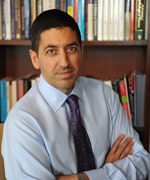
Sandro Galea, MD, MPH, DrPH, is a physician and an epidemiologist. Dr. Galea is interested in the social production of health of urban populations. His work explores innovative cells-to-society approaches to population health questions. His primary focus is on the causes of brain disorders, particularly common mood-anxiety disorders and substance abuse. He has long had a particular interest in the consequences of mass trauma and conflict worldwide, including as a result of the September 11 attacks, Hurricane Katrina, conflicts in sub-Saharan Africa, and the American wars in Iraq and Afghanistan. The National Institutes of Health, Centers for Disease Control and Prevention, and several foundations have funded his research.He has published over 400 scientific journal articles, 50 chapters and commentaries, and 7 books and his research has been featured in The New York Times, NPR, the Wall Street Journal, and many other media outlets. During Dr. Galea's tenure as Chair, the Department of Epidemiology has launched several new educational initiatives and substantially increased its focus on six core areas: chronic, infectious, injury, lifecourse, psychiatric/neurological, and social epidemiology. Dr. Galea chairs the New York City Department of Health and Mental Hygiene's Community Services Board and sits on its Health Board. He is past-president of the Society for Epidemiologic Research and an elected member of the Institute of Medicine of the National Academies of Science.
Conflict, mental health, and health system access in Liberia
A study in Nimba County that assesses the interrelations of psychological well-being and health care access in a post-conflict country.
Mental health and well-being among Israelis and Palestinians
A natural history study of mental health and well-being among Israelis and Palestinians in the context of multiple terrorist attacks.
Mental health and service utilization among reserve and National Guard forces
A national cohort study of reserve and National Guard forces that aims to understand the factors, both combat-related and non-combat-related, across the lifecourse that influence mental health and functioning in these groups.